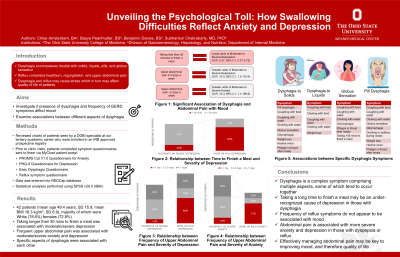Monday Poster Session
Category: Functional Bowel Disease
P2345 - Unveiling the Psychological Toll: How Swallowing Difficulties Reflect Anxiety and Depression
Monday, October 28, 2024
10:30 AM - 4:00 PM ET
Location: Exhibit Hall E

Has Audio

Chloe H. Amsterdam, BA
The Ohio State University College of Medicine
Columbus, OH
Presenting Author(s)
Chloe H. Amsterdam, BA1, Basya Pearlmutter, BS1, Benjamin Davies, BS1, Subhankar Chakraborty, MD, PhD2
1The Ohio State University College of Medicine, Columbus, OH; 2The Ohio State University Wexner Medical Center, Columbus, OH
Introduction: Functional gastrointestinal (GI) disorders like dysphagia and reflux have been linked to anxiety and depression in previous research, yet there remains limited understanding of specific symptom interactions. This study aims to investigate the associations between distinct symptoms of dysphagia and reflux, and varying levels of anxiety and depression.
Methods: Participants were recruited from a tertiary academic medical center motility clinic as part of the Engagement through Multi-faceted Patient Assessment Through Holistic Symptom Questionnaires (EMPATHY) registry, approved by the IRB. Prior to clinic visits, patients completed questionnaires (Promis Cat V1.0-Anxiety, PHQ-9 Depression, Easy Dysphagia, and Reflux symptoms) via the EMR which were reviewed during clinic visits to guide management. Data were managed with REDCap and statistical analyses were performed using SPSS v29.0.
Results: 42 patients (mean age 49.4 years, SD 15.9; mean BMI 18.3 kg/m², SD 8.9) participated, with the majority being female (72.8%) and White (78.6%). Significant findings included: choking during drinking liquids associated with moderate to severe anxiety (43% vs. 0% in those without choking; LR 6.21, p = 0.045), and taking >30 minutes to finish a meal linked to moderate to severe depression (46% vs. 18% in faster eaters; LR 6.08, p = 0.048). Reflux symptoms did not significantly correlate with anxiety or depression, but sleep difficulties strongly associated with depression (Chi-square 20.7, p < 0.001). Dysphagia with liquids was linked with coughing/choking on solids/liquids, and dysphagia with solids correlated with choking on solids/liquids, coughing with solids, and odynophagia. Both types were associated with weight loss. Globus sensation was associated with coughing/choking on solids/liquids, odynophagia, prolonged meals, and post-meal phlegm.
Discussion: Our findings underscore the detrimental impact of poorly managed dysphagia and reflux symptoms on quality of life and their potential role in exacerbating anxiety and depression. Notably, disrupted sleep due to reflux emerged as a significant factor contributing to depression, highlighting its impact on well-being. We identified specific dysphagia-related challenges suggesting targetable diagnostic and therapeutic interventions to improve outcomes. This study contributes to understanding the intricate relationships between dysphagia, reflux symptoms, and mood disorders, aiming to refine strategies in clinical practice.
Note: The table for this abstract can be viewed in the ePoster Gallery section of the ACG 2024 ePoster Site or in The American Journal of Gastroenterology's abstract supplement issue, both of which will be available starting October 27, 2024.
Disclosures:
Chloe H. Amsterdam, BA1, Basya Pearlmutter, BS1, Benjamin Davies, BS1, Subhankar Chakraborty, MD, PhD2. P2345 - Unveiling the Psychological Toll: How Swallowing Difficulties Reflect Anxiety and Depression, ACG 2024 Annual Scientific Meeting Abstracts. Philadelphia, PA: American College of Gastroenterology.
1The Ohio State University College of Medicine, Columbus, OH; 2The Ohio State University Wexner Medical Center, Columbus, OH
Introduction: Functional gastrointestinal (GI) disorders like dysphagia and reflux have been linked to anxiety and depression in previous research, yet there remains limited understanding of specific symptom interactions. This study aims to investigate the associations between distinct symptoms of dysphagia and reflux, and varying levels of anxiety and depression.
Methods: Participants were recruited from a tertiary academic medical center motility clinic as part of the Engagement through Multi-faceted Patient Assessment Through Holistic Symptom Questionnaires (EMPATHY) registry, approved by the IRB. Prior to clinic visits, patients completed questionnaires (Promis Cat V1.0-Anxiety, PHQ-9 Depression, Easy Dysphagia, and Reflux symptoms) via the EMR which were reviewed during clinic visits to guide management. Data were managed with REDCap and statistical analyses were performed using SPSS v29.0.
Results: 42 patients (mean age 49.4 years, SD 15.9; mean BMI 18.3 kg/m², SD 8.9) participated, with the majority being female (72.8%) and White (78.6%). Significant findings included: choking during drinking liquids associated with moderate to severe anxiety (43% vs. 0% in those without choking; LR 6.21, p = 0.045), and taking >30 minutes to finish a meal linked to moderate to severe depression (46% vs. 18% in faster eaters; LR 6.08, p = 0.048). Reflux symptoms did not significantly correlate with anxiety or depression, but sleep difficulties strongly associated with depression (Chi-square 20.7, p < 0.001). Dysphagia with liquids was linked with coughing/choking on solids/liquids, and dysphagia with solids correlated with choking on solids/liquids, coughing with solids, and odynophagia. Both types were associated with weight loss. Globus sensation was associated with coughing/choking on solids/liquids, odynophagia, prolonged meals, and post-meal phlegm.
Discussion: Our findings underscore the detrimental impact of poorly managed dysphagia and reflux symptoms on quality of life and their potential role in exacerbating anxiety and depression. Notably, disrupted sleep due to reflux emerged as a significant factor contributing to depression, highlighting its impact on well-being. We identified specific dysphagia-related challenges suggesting targetable diagnostic and therapeutic interventions to improve outcomes. This study contributes to understanding the intricate relationships between dysphagia, reflux symptoms, and mood disorders, aiming to refine strategies in clinical practice.
Note: The table for this abstract can be viewed in the ePoster Gallery section of the ACG 2024 ePoster Site or in The American Journal of Gastroenterology's abstract supplement issue, both of which will be available starting October 27, 2024.
Disclosures:
Chloe Amsterdam indicated no relevant financial relationships.
Basya Pearlmutter indicated no relevant financial relationships.
Benjamin Davies indicated no relevant financial relationships.
Subhankar Chakraborty indicated no relevant financial relationships.
Chloe H. Amsterdam, BA1, Basya Pearlmutter, BS1, Benjamin Davies, BS1, Subhankar Chakraborty, MD, PhD2. P2345 - Unveiling the Psychological Toll: How Swallowing Difficulties Reflect Anxiety and Depression, ACG 2024 Annual Scientific Meeting Abstracts. Philadelphia, PA: American College of Gastroenterology.
